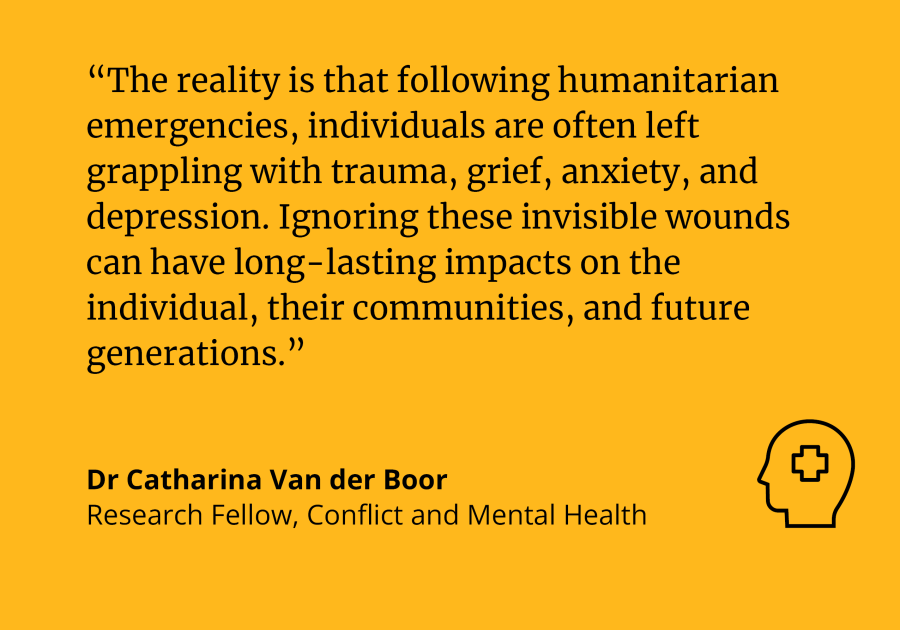Prioritising mental health in humanitarian response: the vital role of mental health and psychosocial support
6 October 2023 London School of Hygiene & Tropical Medicine London School of Hygiene & Tropical Medicine https://lshtm.ac.uk/themes/custom/lshtm/images/lshtm-logo-black.png
World Mental Health Day is an important reminder that mental health is fundamental to well-being and deserves equal attention to physical health. In times of crises when communities grapple with the aftermath of natural disasters, conflict, pandemics, and other crises, the need for a comprehensive, inclusive, and sensitive approach to mental health and psychosocial support (MHPSS) becomes increasingly vital.
During humanitarian emergencies, the immediate focus is often on providing support for basic needs including food, shelter, and medical aid. Whilst these are unquestionably critical necessities, World Mental Health Day is a helpful reminder that the MHPSS of affected individuals is frequently overlooked in immediate response efforts. The reality is that following humanitarian emergencies, individuals are often left grappling with trauma, grief, anxiety, and depression. Ignoring these invisible wounds can have long-lasting impacts on the individual, their communities, and future generations.
One of the biggest challenges in addressing MHPSS needs during humanitarian crises is the persistent stigma that surrounds mental health. In many contexts, seeking support for mental distress is still viewed as a sign of weakness, and misconceptions and cultural taboos often prevent individuals from seeking the support they need. As such, there is much work still to be done to break these barriers and destigmatise mental health concerns. By integrating comprehensive mental health education and awareness programs into relief efforts, we can actively challenge stigmatising notions, and continue working towards creating environments where individuals and communities are safe and comfortable to seek the support they need.
Breaking down the stigma surrounding mental health also directly ties into recognising and nurturing personal strengths in those affected by crises. It is important to remember that being affected by a humanitarian crisis is not a disorder in itself. Rather, it is a natural response to an extraordinary situation. Therefore, fostering resilience and recognising personal strengths is at the heart of effective MHPSS response. We need to acknowledge the inherent strength and resourcefulness of individuals and communities and empower them to navigate through adversity in contextually valid ways. Building on communities’ innate strengths, MHPSS interventions can foster agency and resilience and enable communities to recover from adversity in an empowered and sustainable way.
As we mark World Mental Health Day, let’s remember that mental health is a fundamental human right. In times of crisis, the provision of MHPSS is not only an act of compassion, but a strategic imperative. By prioritising mental health within humanitarian response efforts, we can foster resilience, promote healing, and build stronger, more empowered communities that are better equipped to face the challenges of the future.
If you enjoyed this article and would like to build a career in global health, we offer a range of MSc programmes covering health and data, infectious and tropical diseases, population health, and public health and policy.
Available on campus or online, including flexible study that works around your work and home life, be part of a global community at the UK's no.1 public health university.